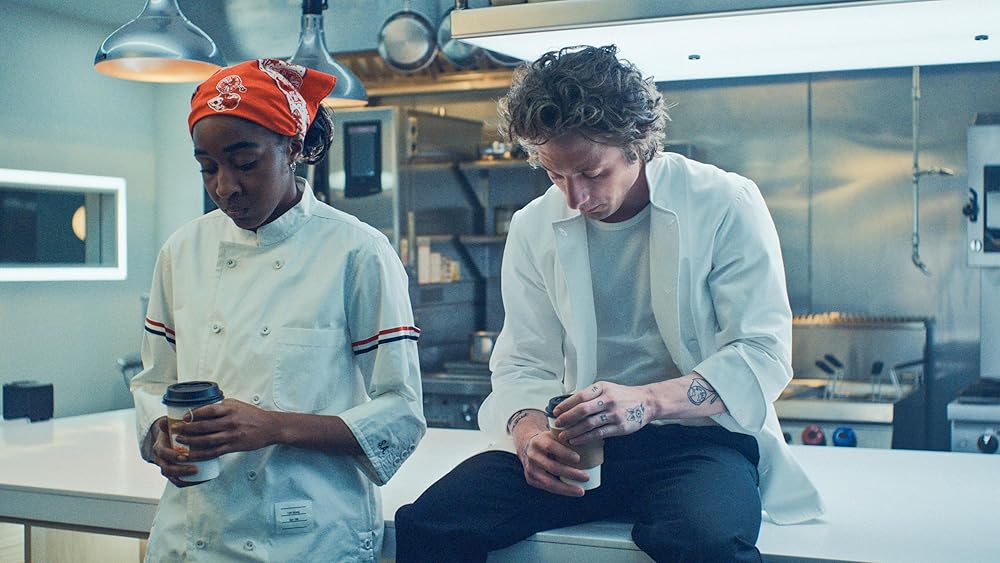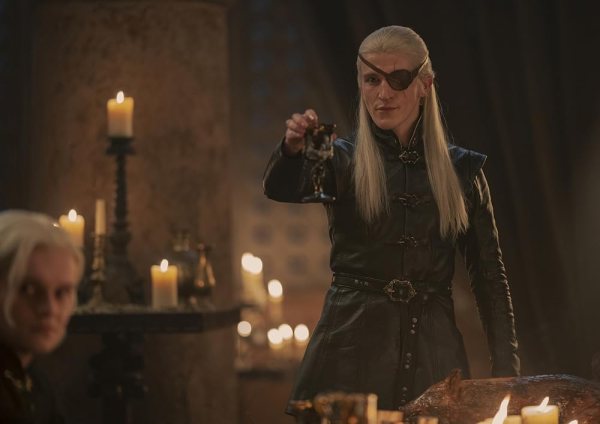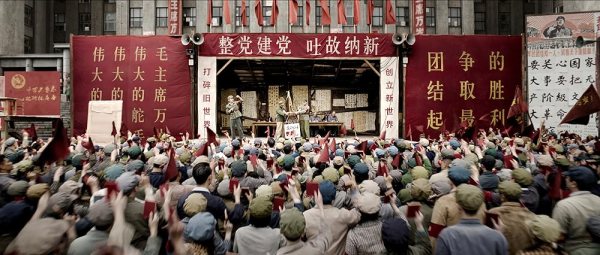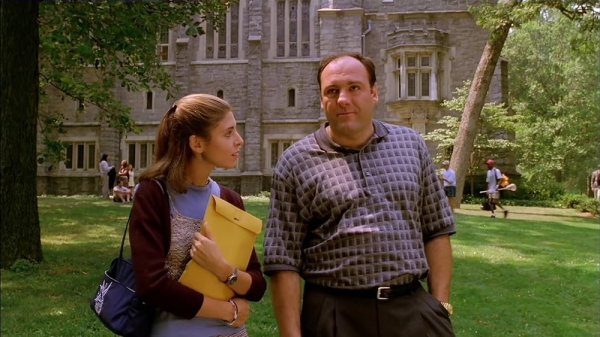In early 1904, the Irish novelist James Joyce—at that time a decade away from his first major publication—submitted a short story to the literary magazine Dana. It wasn’t meant to be. Explaining his decision to reject Joyce’s piece, Dana’s editor, W.K. Magee, pithily remarked, “I can’t print what I can’t understand.”
Joyce eventually reworked the novel and published it in 1916 as A Portrait of the Artist as a Young Man. An idiosyncratic and unapologetically opaque exercise in stream of consciousness, the book has, in the decades since, come to be seen as a milestone in modernist literature. In part, Portrait bet that readers would find something alluring about the novel’s unfiltered presentation of a character’s inner thoughts, with all the stilted and disjointed turns that make up much of human rationalization.
I was reminded of Joyce’s novel—and of its first draft’s failure—reading the initial reactions to the latest season of FX’s hit series, The Bear. While Seasons 1 and 2 received widespread acclaim for their heartfelt and often hilarious look at the people who power Chicago’s food scene, Season 3 of the dramedy got a much more tepid, even downright hostile reaction. “The Bear Is Not a Good Show,” Slate declared. “The Bear Takes a Step Down in an Aimless Season 3,” Variety posited.
That latter charge in particular gets at one of the most revealing and misunderstood aspects of The Bear’s latest turn. Season 3 is certainly experimental, and not all of its experiments are successful. But part of why many critics have painted it as “aimless,” to borrow Variety’s phrase, evinces something else about our expectations of what a TV series should do—something that doesn’t quite do justice to the third season’s flawed yet nervy creativity.
The series tells the story of Carmy Berzatto (Jeremy Allen White), a culinary prodigy with a dysfunctional upbringing who returns to his hometown of Chicago following his brother’s suicide. After being tasked with keeping the family sandwich shop afloat in Season 1, Carmy spent Season 2 trying to turn the rinky-dink joint (The Beef) into a high-end restaurant (The Bear). And he succeeded—at a high personal cost. To varying degrees, he compromised some of his closest relationships, from his dependable sous-chef Sydney (Ayo Edebiri) to his brusque “cousin” Richie (Ebon Moss-Bachrach) to his considerate girlfriend Claire (Molly Gordon). This is where Season 3 picks up.
But a synopsis only takes you so far with The Bear’s new turn, and its critics rightly observe that much of its third season feels—at least at first glance—decidedly uninterested in continuing the story. The season premiere is a heavily edited, episode-long montage that cuts back and forth in a matter of seconds between pivotal moments in Carmy’s life: his decision to leave Chicago and become a professional chef, stints at kitchens in Copenhagen and New York, missing his brother’s funeral. Twenty-one of the 27 total minutes in the second episode are spent lingering in a single scene, as Carmy writes down a list of “nonnegotiables” for his kitchen, including that he wants to curate an entirely new menu every single day. (“That’s how restaurants of the highest caliber operate,” he says.)
Watching Season 3, it quickly becomes clear that the show is especially committed to these sorts of filmmaking conceits, at times even at the expense of advancing its plot or developing its characters. But what The Bear’s new critics overlook is that the show has already pursued those other goals, and quite successfully. Now, showrunner Christopher Storer seems focused on something else, something that tries to distinguish his show’s new season from both the episodic, plot-heavy network hits of the ‘80s and ‘90s (think Law & Order or Seinfeld) and from more character-driven prestige shows of recent times (like Succession or Barry).
Indeed, The Bear Season 3 seems to be driven by a sort of Joycean concern: How can you depict, as closely as possible, what it’s like to be in Carmy’s state of mind? How can you not simply let the viewer know that he’s alienated from loved ones and obsessed with perfecting his craft, but rather use the conventions of film and TV to translate what Richie describes as a mental “prison of [his] own design”?
More than plot or character, The Bear’s third season seems intent on recreating that emotional state of mind: a sense of being stuck, unnerved, and—a word that comes up again and again—“haunted.” The frequent cuts and pans, the detailed close-up shots of plated dishes or ingredients, the flashbacks littered throughout the season all serve this purpose. The season might bite too hard into these stylistic choices, but they’re not indicative of aimlessness—they’re part of a calculated stasis.
And for what it’s worth, focusing so intently on Carmy’s inner thoughts confirms much of The Bear’s continued appeal. Its relatability, for example. Just like you don’t have to be a food connoisseur or have worked in a restaurant to appreciate the rigors necessary to turn The Beef into The Bear—in a way, The Bear is a show for anyone who’s worked in a high-stress job—you don’t have to share Carmy’s particular pain to relate to his scattered mind. The way the show captures his inability to coordinate his thoughts should resonate with anyone who feels but can’t quite articulate how the constant stream of information—from a piling inbox to an avalanche of tweets or Slack messages—makes focus elusive.
Similarly, depicting Carmy’s scattered mind keeps the show from romanticizing the successes of his restaurant. A truly aimless show would have tried to move the plot along too quickly, having Carmy cross off one challenge after another on his journey to culinary greatness. No, The Bear Season 3 makes abundantly clear that Carmy’s greatness—and greatness in general—comes at a steep personal cost.
None of which is to say there aren’t drawbacks to the third season’s style. A highlight of Season 2 was Richie’s evolution from being cynical about Carmy’s plan for the restaurant to finding a certain dignity in pursuing a craft within it. The development of his relationship with Carmy is largely put on ice, as is the story of pastry chef Marcus (Lionel Boyce), who likewise had a revelatory last season that ended in grief.
And while it’s unfair to dismiss the season’s calculated stasis, it’s worth noting that some of its most heartfelt moments deviate from it. A long conversation between Tina (Liza Colón-Zayas), a line cook at The Beef/Bear, and a figure from her past in the sixth episode, for example, both recalls some of the best aspects of Season 2 and reminds viewers why she’s been a consistent source of unexpected joy in the series. In a similar moment, Claire, an emergency room doctor, recounts taking care of a young patient who had fallen through a glass table at a party and went into shock following an accidental allergic reaction. “She couldn’t stop laughing” upon waking, Claire tells Carmy. “I don’t think it hurt yet,” she adds, succinctly encapsulating The Bear’s belief that pain and humor are intimately intertwined.
There’s a big difference between pointing out that Season 3 of The Bear doesn’t quite meet the high bar set by its predecessor and saying it’s time to regard it as an aimless, bad show. On the contrary, it remains one of the most humanistic series on TV, one that’s willing to experiment with how to keep up with its viewers’ appetite. Perhaps W.K. Magee was right to pass on the early Portrait draft, but it’d be a mistake to miss what The Bear is cooking.







Please note that we at The Dispatch hold ourselves, our work, and our commenters to a higher standard than other places on the internet. We welcome comments that foster genuine debate or discussion—including comments critical of us or our work—but responses that include ad hominem attacks on fellow Dispatch members or are intended to stoke fear and anger may be moderated.
With your membership, you only have the ability to comment on The Morning Dispatch articles. Consider upgrading to join the conversation everywhere.